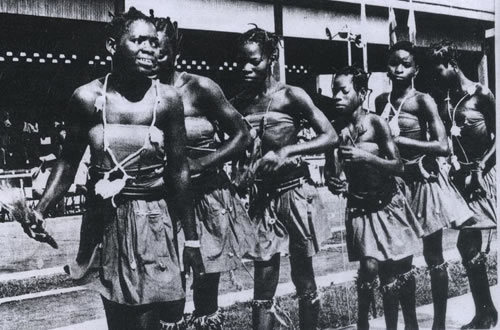Ohonmoimen in the local language means ‘it is all well for me’. As the name implies Ohonmoimen festival is celebrated annually between January and March by Iuleha clan in Owan to mark the end of a fruitful year and the beginning of another. It offers opportunity for expressing gratitude to God, through ancestral gods and the gods of harvest for all the good things of the past. Prayers are also offer for protection and fruitful harvest in the coming year.

Agbeloje (dance for royalty) from Uzebba
The rituals associated with Ohomoimen festival are carried out it three place know as sacred forests in the clan. These are OSEZE forest near okhijo village where the elders meet and appoint a time for the festival; OHIOJO forest and OSI forest where the images, drums and other appurtenances of the masqueraders are kept. The forest is out of bounds both for women and males not yet initiated.
Citizen within a particular age group are initiated every five years and these watch the forests during the festival. On announcement that a date has been fixed for the sacred forests harvest palm-nuts and from these nuts palm oil is made for the ceremonial lamps. The forest are also cleared and kept clean.
A curfew is imposed in the clan on the eve of the festival to allow the celebrants to convey materials to the sacred forests. That also stands as the last time people in the clan are allowed to climb palm tree and sing song other than festival songs. No light is to be seen outside during the curfew except when a pregnant woman is under labour when this does happen the family pays a fine of a she-goat.
At night, a frightful notice is made with strings by initiated people until 4a.m when they retire to the sacred forest. After a period of silence, the most elderly man or his reprehensive beats the first sacred drums in Oseze forest. On the booming of this, a second drum is beaten in Okhijo forest followed by a reply from Osi forest
This heralds the beginning of the festival and the drums are beaten continuously thereafter in the sacred forests. In the evening, masqueraders dance in the streets visit elders in their homes and pray for peace and prosperity throughout the clan. Seven masqueraders take part in this exercise—two on the first day and one each other day until the last day when all the seven masqueraders, followed by a large crowd, parade the town.
Citizen of Iuleha clan at home and elsewhere participate in the ceremonies. They exchange gifts entertain friends and well wishers and pay homage to father-in-law during the period. The visit of the last masquerade called Ologho, to the town when it prays and dace in various homes marks the end of the three- month festival.